Does Lottery Allow Gaming the System?
Several big winners have close ties to retailers selling the winning tickets.
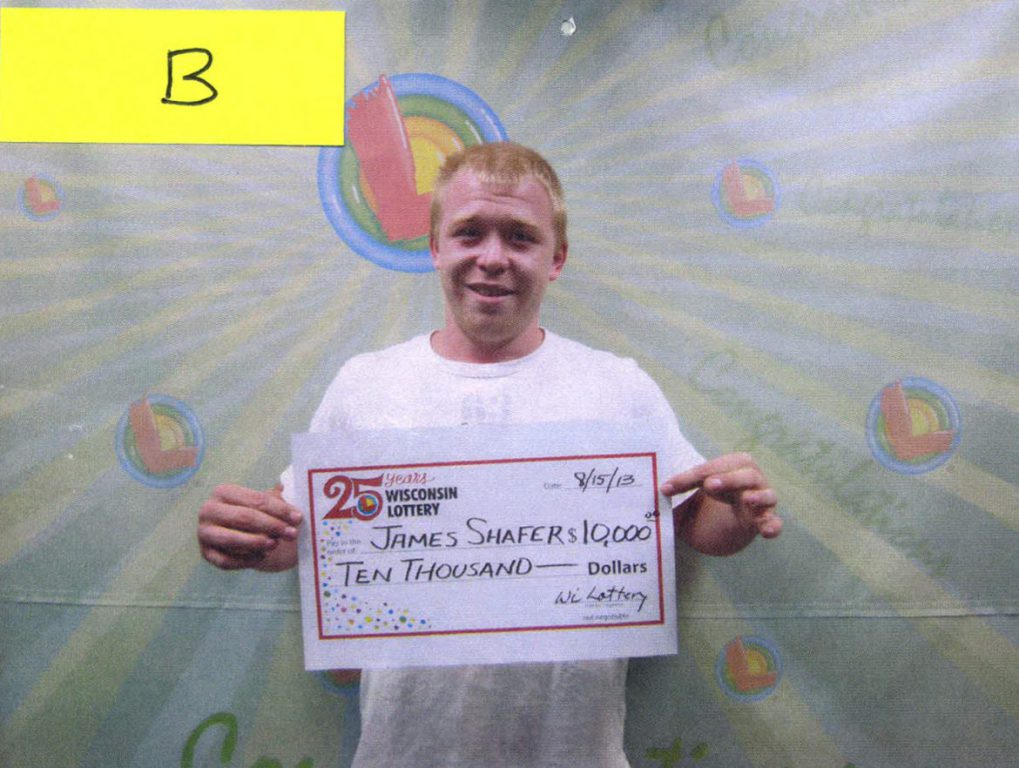
James Shafer, from Eau Claire, Wis., poses with a check for $10,000 after cashing in a stolen winning ticket for Wisconsin’s “20X The Money” scratch-off game. Justin Brummond, Shafer’s brother, promised to pay him $500 for cashing the stolen ticket. The brothers and a store clerk were charged and convicted in connection with the theft. Photo from the Wisconsin Lottery.
Since 2009, Khalil Audi of Cudahy, Wisconsin, has cashed in lottery tickets 33 times to the tune of about $80,000.
His $10,000 win from Badger Cash Blowout? A one-in-72,000 chance. When he bought a $30 Super Millions scratch-off ticket, he had a one-in-200,000 shot of winning $5,000 — the same odds as giving birth to conjoined twins.
But that ticket cashed, too.
With wins as recent as 2017, Audi’s luck has not run out. Along the way, he has won Pick 4 a handful of times. Audi’s wins are surprising, but he is not even the luckiest person in Wisconsin.
According to Wisconsin Lottery data obtained by Gaming the Lottery, an international investigation into the global lottery industry, the state’s most frequent winner was Annie Mason of Milwaukee, Wisconsin. Mason bought tickets worth $600 or more 65 times since 2000, for total winnings of $466,780. She hung up twice when contacted by a reporter.
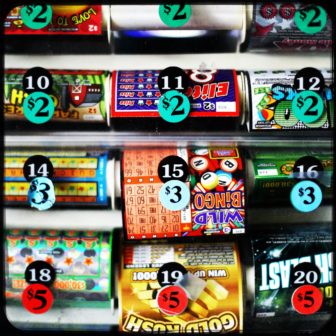
Lottery tickets are shown for sale in Stoughton, Wis. Wisconsin has no laws preventing retail lottery sellers or their employees or owners from buying and cashing in lottery tickets at their own stores — a gap in regulation that could open the state’s lottery system to fraud. Photo by Coburn Dukehart / Wisconsin Center for Investigative Journalism.
In that same time, 11 people have cashed 20 or more winning tickets of at least $600, earning prizes totaling $100,000 or more each.
Reached at work — the store where he has scored nearly all of his lottery wins — Audi declined to comment.
Thousands of people throughout the state play a variety of games: Some stick with scratch-off games while others choose to try their luck with traditional lotteries, such as Megabucks, Powerball, SuperCash! or Badger 5, which involve guessing numbers that will appear in daily or biweekly drawings. The lottery has provided more than $4.1 billion in property tax relief and $7.8 billion in prizes since it was launched in 1988.
The Wisconsin Center for Investigative Journalism found that at least three of the top 13 players who have won 20 times or more in recent years have close ties to the retailers selling them the winning tickets — including Audi, who works at Charlie’s Liquor & Tobacco Mart, home to 30 of his 33 wins.
Wisconsin has no laws barring lottery retailers or their employees from buying or cashing in lottery tickets at their own stores — a gap in regulation that could open the state’s $600-million-a-year lottery system to fraud. Canada learned that lesson in 2006 when provincial lotteries in Ontario and British Columbia were rocked by scandals uncovered in media reports involving store owners and clerks.
Government investigations into the scandals found the lotteries had “an overemphasis on profit seeking” and were more “protective of lottery ticket retailers than customers,” according to a 2013 analysis in the Journal of Gambling Issues by Garry Smith, professor emeritus at the University of Alberta-Edmonton. Smith also cited “willful blindness” and lotteries’ failure to “rigorously” examine their risks, rendering them “not fully aware of the vulnerabilities in their systems.”
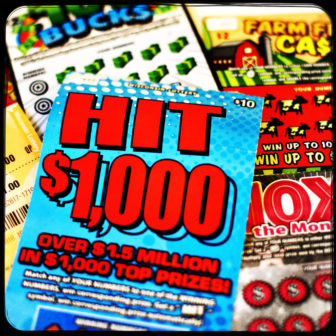
Wisconsin offers a variety of lottery games, including scratch-offs and games that involve guessing numbers that appear in daily or biweekly drawings. Photo by Coburn Dukehart / Wisconsin Center for Investigative Journalism.
In the United States, news reports from Pennsylvania, Florida, Massachusetts and other states have revealed suspicious pockets of frequent winners, in some cases tied to owners or clerks at stores that sell lottery tickets.
A 2009 Iowa Ombudsman report recommended that Iowa’s lottery consider banning retail employees from playing the lottery at stores where they work to ensure the games’ integrity. The ombudsman’s office investigates citizen complaints about state government.
The Iowa review, which included examining frequent lottery winners, found several store owners and their employees among those exhibiting against-the-odds luck. One clerk had claimed eight prizes for a total of $266,000 in less than one year’s time at the store where he worked, the ombudsman found.
But a 2017 Des Moines Register investigation found Iowa did not adopt that recommendation, and employees of lottery retailers continue to rake in big winnings, including one who cashed in $28,000 in stolen tickets. Lottery officials told the newspaper that such a requirement would be unworkable and add unnecessary government bureaucracy.
In Wisconsin, retailers also get bonuses of up to $100,000 when they sell winning tickets, providing further monetary incentive to bend the system in their favor, one expert said.
When presented with a list of 20 of Wisconsin’s most frequent lottery winners, Jean Adler, deputy administer of the Wisconsin Lottery, said all have been reviewed and continue to be monitored “to watch for additional wins that might suggest further investigation.” Only one of the 20 has been the subject of a completed investigation. He was cleared in 2005.
In addition, a 2010 sting operation involving hundreds of retailers in Wisconsin found five clerks took winning tickets, each worth $5,000, from law enforcement officers posing as customers. Two thought the tickets actually were losers and threw them away, Adler said. The other three took the tickets knowing they were winners. Two cashed them and were later prosecuted, she said.
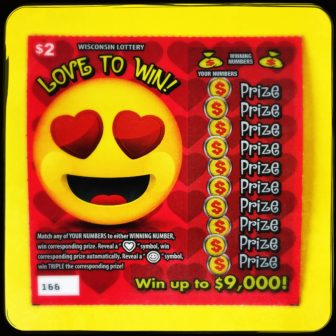
A scratch-off ticket available for sale in Wisconsin. Photo by Coburn Dukehart / Wisconsin Center for Investigative Journalism.
“I don’t think retailers are perfect, but they’re pretty good,” Adler said.
Adler declined to describe the specific mechanisms the state agency uses to guard against retailers or others gaming the system, saying it could tip off fraudsters about how to cheat. She said there has been just one completed investigation into lottery fraud since 2012. It involved the theft of a winning ticket by a store clerk in 2013.
There are several ways people — mainly employees, store owners or lottery insiders — have cheated lotteries across the nation:
- Store owners or employees can “micro scratch” tickets with small blades, revealing numbers that show whether the card is a winner. This method stacks the deck against people buying from the store, as the retailer sells only losing tickets. In Tampa, Florida, authorities arrested a store employee in January 2017 for “micro scratching” tickets. He cashed at least seven tickets worth $1,000 each. Adler said the lottery is investigating a retailer suspected of “micro scratching” tickets in Wisconsin.
- In some cases, store owners or employees can steal tickets from customers who return to confirm their wins. In 2013, an Eau Claire, Wisconsin, man cashed a $10,000 winning ticket that a lottery store clerk had stolen from an elderly customer.
- Eddie Tipton, a computer programmer for the Multi-State Lottery Association, rigged drawings in four states, including Wisconsin, winning $2.2 million over six years. Tipton installed software to generate specific winning numbers that he passed along to associates. In 2017, Tipton was sentenced up to 25 years in prison; he still owes the Wisconsin Lottery $406,600 in restitution. His co-conspirator, Robert Rhodes, has already paid the state lottery $310,000, with $99,600 more still uncollected.
Officials from the Wisconsin Lottery say frequent winning is not necessarily evidence of wrongdoing. People who win a lot are often big-time players who spend a lot of money on tickets, increasing their odds, Adler said.

Laura Albert, a University of Wisconsin-Madison associate professor who is an expert on lottery odds, says there are legal ways to increase the chances of winning the lottery. Photo by Saiyna Bashir / The Cap Times.
Laura Albert, a University of Wisconsin-Madison professor and expert on lottery odds, agreed. Albert said some people play the lottery professionally using “schemes that seem kind of shady but are actually OK.” This can be done by monitoring games’ payouts, and then buying a bunch of tickets when the game is far below normal payouts, she said.
“There are a couple of different ways to win the lottery frequently. Some of them are fraudulent and some of them are not fraudulent — they’re just professional lottery players,” Albert said.
Wisconsin Lottery data do not show how often people play the lottery, how much each person spends or what games they play. That makes it impossible to calculate exactly what odds these frequent winners are beating — and difficult to figure out if they are cheating.
Philip B. Stark is a professor of statistics at the University of California-Berkeley who has studied lottery odds for years. He has devised a method to estimate the minimum amount of money these winners would need to spend on lottery tickets in order to have a one-in-10 million chance of winning.
“It’s really trying to be careful, and not accuse anybody of anything where there was even a slim chance of where they might have just done this through just honest play,” Stark said. “The one in 10 million was designed to be on the careful side.”
To put those odds in perspective, each year Americans have a roughly one in a million chance of getting struck by lightning. So, Stark’s minimum-spent calculation is intentionally lenient.

University of California-Berkeley statistics professor Philip B. Stark has devised a method for determining the likely amount of money a person would have to spend to win lottery prizes. He says some frequent winners’ odds suggest that something besides good luck may be at play. Photo from the University of California-Berkeley.
Stark said most of Wisconsin’s frequent winners do not appear to be particularly suspicious, based on his analysis. But some stand out.
In the case of Audi, Stark said he would have to spend $191,697 over eight years, or about $66 a day, to have a one-in-10 million chance of winning his $78,300 in prizes.
Stark said people with connections to the places where they bought their winning tickets also raise questions. For example, Audi’s luckiest store is the Cudahy convenience store where he works.
Audi declined to comment but suggested a reporter contact Uri Marichuck, the owner of King’s Row Liquor in South Milwaukee. Marichuck was happy to discuss his winnings. He has become a familiar face to lottery officials, winning $31,000 on 25 tickets over the past several years, he said. (The Center’s data show 18 wins for $24,000 since 2009.)
“I’m a lucky guy. It’s the same thing in the casino,” Marichuck said, joking that he wins so much he expects to be kicked out of the gambling hall at any time.
Marichuck said his store has a reputation for selling winning tickets, so many people play the lottery there. And he has seen fraud first hand. About nine years ago, he reported another retailer in South Milwaukee after discovering it was stealing customers’ winning tickets.
Another lucky store employee is Steven Kazik. He has claimed 21 winning tickets for $128,417, with at least 20 wins coming at Oklahoma Liquor in Milwaukee, where he has worked. The Center was unable to reach Kazik, who lives in Oak Creek, Wisconsin, for comment.
Charanjit Singh owned gas stations in Neenah and Appleton, Wisconsin, where he won 21 times for nearly $90,000. Singh could not be reached for comment.
Frequent winner probed
Stark also found unlikely odds for one frequent winner, Jeffrey Hintz, whose extreme luck also drew the attention of Wisconsin Lottery officials.
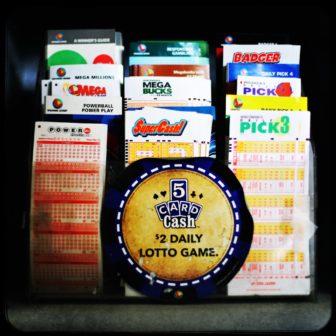
Lottery tickets are shown for sale in Wisconsin. Lottery ticket prices vary depending on the game from $1 to $30 a ticket. Photo by Coburn Dukehart / Wisconsin Center for Investigative Journalism.
By Stark’s calculations, Hintz would have had to spend nearly $1.1 million for the one-in-10-million chance of winning 37 times since 2003 for a total of $117,300. But the Wisconsin Department of Revenue, which administers the lottery, investigated — and cleared — Hintz more than a decade ago.
On March 24, 2005, Hintz experienced what would be most anyone’s luckiest day. For him, it was just another Thursday. Hintz, of Bonduel, Wisconsin, won $1,000 from the Wisconsin Lottery’s Super 2nd Chance game, in which players send in envelopes with $5 worth of losing tickets for a chance to win a drawing.
The next week, he won again. And then again, and again, and again.
At the end of his blistering streak, Hintz won five times in a row. Hintz and his wife, Lisa, have won the Wisconsin Lottery’s Super 2nd Chance game at least 35 times since 2000, according to the Center’s data.
Following Hintz’s lucky streak, officials launched an investigation to determine if his winnings were legitimate, according to a 2005 internal review from the Department of Revenue. The probe concluded Hintz won the games fairly, and it offered insight into how seriously some people play to win.
Each week during his winning streak, Hintz sent in at least 500 envelopes containing $2,500 worth of losing tickets — which the review stated was a conservative estimate. One lottery retailer estimated Hintz spent at least $70 a day on tickets there.
When Hintz was winning, the odds of winning Super 2nd Chance ranged from roughly one-in-32,000 to one-in-35,000, according to the review. Hintz submitted so many entries, he increased his chances of winning to about one-in-seven. Even then, the odds of his winning five in a row was one-in-14,000, the review concluded.
Repeat winners monitored
Adler said the lottery reviews all repeat winners from the previous 15 years. She said the Wisconsin Lottery has very few such big winners compared to other states. The Boston Globe found in 2017 that four members of one family had won $11 million over six years from the Massachusetts lottery by cashing in 7,000 winning tickets.
Adler declined to describe the agency’s efforts to ferret out fraud among Wisconsin’s frequent winners. She would not comment on whether there are any other investigations ongoing.
“There are many winners who have won multiple times,” Adler said. “This is monitored on a regular basis. For security reasons, we cannot provide details about how, or how frequently, such winners are monitored, or the thresholds that the Lottery uses to determine ‘frequent winners.’ ”
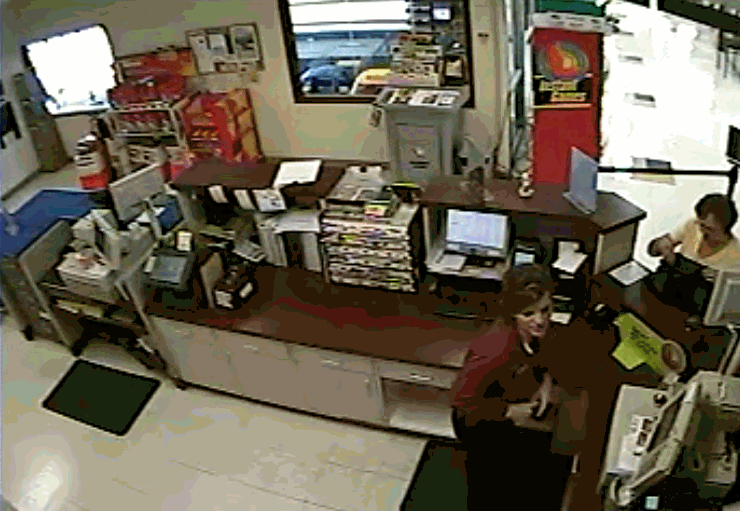
A screenshot of security footage from the Mega West store in Eau Claire, Wis., shows Kimberly Strand working at the counter. She stole a $10,000 winning scratch-off from a customer and gave it to her then-boyfriend Justin Brummond, who convinced his brother to cash it for $500. All three were charged and convicted in connection with the theft. Photo from the Wisconsin Lottery.
She said five employees work full-time on security. In addition, a portion of the job duties for 34 of the agency’s employees is devoted to security, including some who conduct inspections of retailer facilities.
Since 2012, there has been one completed in-depth investigation into a lottery winner suspected of fraud.
In 2013, Kimberly Strand, an employee at a Mega West store in Eau Claire, stole a winning 20X The Money scratch-off worth $10,000 from a customer. Her boyfriend, Justin Brummond, then convinced his brother, James Shafer, to cash it for $500. All three were later charged and found guilty of charges ranging from theft to false representation to intimidating a witness.
Lack of ‘meaningful enforcement’?
Adler said over the past three fiscal years, the Wisconsin Lottery has received less than $2,000 in restitution, all for stolen lottery tickets that were cashed. That is a tiny fraction of the payout, which totaled $363 million in fiscal year 2017 alone.
Stark said based on the lack of investigations, prosecutions and restitution — along with the suspicious patterns he detected among some of Wisconsin’s frequent winners — “there doesn’t seem to be meaningful enforcement.”
“Given how strong the evidence of fraud is, $2,000 of restitution does not seem like they could be pursuing fraudsters very frequently,” Stark said.
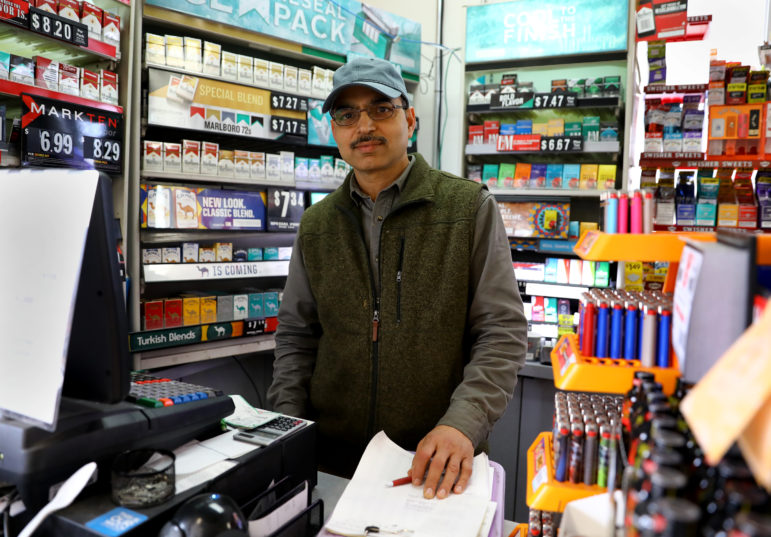
Mirza Akhtar has owned the Food Pantry Citgo in Stoughton, Wis., since 2006. The store has been the source of a number of big lottery-winning tickets over the years. The wall around the checkout is lined with pictures of past winners. Photo by Coburn Dukehart / Wisconsin Center for Investigative Journalism.
Some retailers say they employ their own security measures. Mirza Akhtar, who has owned the Food Pantry Citgo in Stoughton, Wisconsin, since 2006, does not allow employees to buy lottery tickets and check themselves out.
“They can’t buy tickets and scratch it by themselves,” Akhtar said. “I told them they can’t.”
Akhtar’s store has been host to a fair share of big winnings over the years. The wall around the checkout is lined with pictures of past winners, which helps show customers that “someone actually won” on tickets bought at his store.
Among them is Patrick Nowlin. In 2008, Nowlin purchased a winning ticket worth $40.1 million. Nowlin chose a lump-sum payment that, after taxes, came out to about $10 million, according to the Wisconsin State Journal.
For winning tickets worth $600 or more, retailers get 2 percent of the winning amount as commission, with a maximum bonus of $100,000, according to a recent audit of the lottery.
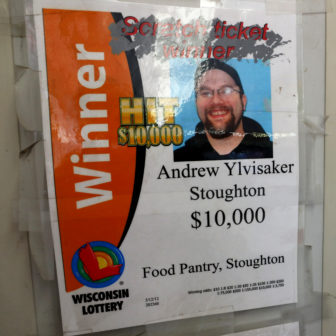
Andrew Ylvisaker, pictured here on a sign at the Food Pantry Citgo in Stoughton, Wis., has won numerous $1,000 prizes and one for $100,000 at the store. He also won $1 million at a Kwik Trip across town. Ylvisaker has won the Wisconsin lottery 28 times for a total of more than $1.1 million since 2007, lottery records show. Photo by Coburn Dukehart / Wisconsin Center for Investigative Journalism.
As a part of the lottery’s incentive program, Akhtar got $100,000 before taxes for selling Nowlin’s winning ticket. Another name that pops up at Akhtar’s store around a dozen times: Andrew Ylvisaker, with a lot of $1,000 prizes and one for $100,000. Across town, he also won $1 million at a Kwik Trip gas station.
Ylvisaker has won 28 times for a total of just over $1.1 million since 2007, which makes him one of the state’s most prolific winners. Akhtar said Ylvisaker does not work at his store but comes in two or three times a week and usually spends roughly $160 on tickets each time — more if he is winning. The Center was unable to reach Ylvisaker for comment.
While there is no evidence of any wrongdoing in Akhtar’s store, experts said that these kind of incentives could motivate retailers to cheat in some cases.
“If you give someone a financial incentive, it is always going to introduce that incentive for behavior you don’t want. For what degree, it depends on how incentivizing it is,” Albert said. “But that is definitely a risk in the system.”
Stark said fraud is typically not a big concern to lottery officials because it generally does not affect revenue.
“In some cases there is enforcement, and in some cases there is not. What I find to be especially of concern is that the officials in charge of lotteries are just so quick to write this stuff off to, ‘Oh, that’s the thing about the lottery, people tend to get lucky,’ ” Stark said.
“Yeah — but not that lucky.”
Peter Coutu is a University of Wisconsin-Madison journalism student. Reporter Mukhtar Ibrahim analyzed data for this story while working at the Wisconsin Center for Investigative Journalism in a fellowship supported by the Columbia University Graduate School of Journalism. Reporting on this story was supported by funding from publish.org, a nonprofit, community-based organization that creates peer-reviewed journalism. The Center’s collaborations with journalism students are funded in part by the Ira and Ineva Reilly Baldwin Wisconsin Idea Endowment at UW-Madison. The nonprofit Center (www.WisconsinWatch.org) collaborates with Wisconsin Public Radio, Wisconsin Public Television, other news media and the UW-Madison School of Journalism and Mass Communication. All works created, published, posted or disseminated by the Center do not necessarily reflect the views or opinions of UW-Madison or any of its affiliates. Editor’s note: The lottery ticket photos were shot with an iPhone 6 and run through the Hipstamatic app on the iPhone. The filters used were the Loftus lens for added saturation, the Love 81 film, which adds a black textured frame, and the Triple Crown flash, which boosts saturation and contrast.
-
Legislators Agree on Postpartum Medicaid Expansion
 Jan 22nd, 2025 by Hallie Claflin
Jan 22nd, 2025 by Hallie Claflin
-
Inferior Care Feared As Counties Privatize Nursing Homes
 Dec 15th, 2024 by Addie Costello
Dec 15th, 2024 by Addie Costello
-
Wisconsin Lacks Clear System for Tracking Police Caught Lying
 May 9th, 2024 by Jacob Resneck
May 9th, 2024 by Jacob Resneck






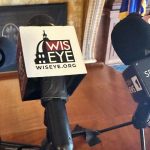















Well done, Mr. Coutu.